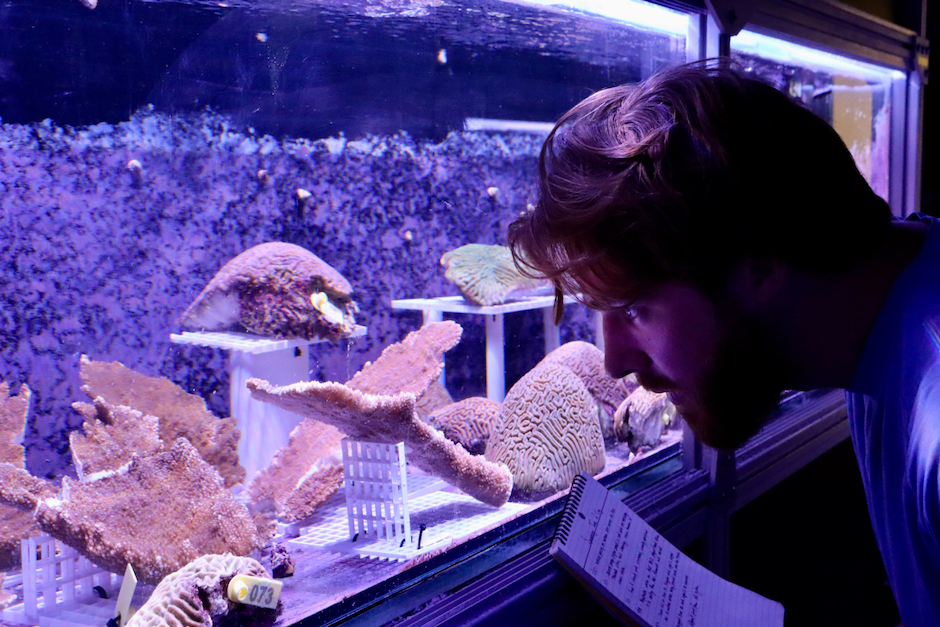In a groundbreaking effort to combat the devastating impacts of rising ocean temperatures on Florida’s coral reefs, scientists from the University of Miami Rosenstiel School of Marine, Atmospheric, and Earth Science traveled to Honduras to source new coral parents to help Florida’s corals survive climate change.
This scientific initiative aims to study and breed corals from a unique site in Tela Bay, off the northern coast of mainland Honduras, where corals routinely experience temperatures that would normally cause widespread coral bleaching elsewhere. These reefs also experience freshwater impacts from a local lagoon and are often characterized by turbid, low-visibility conditions. Yet corals in the Bay are thriving and appear to have shown tremendous resilience to heat stress and disease. Elkhorn corals, in particular, occur in abundance along sections of the shallowest areas.
Led by Andrew Baker, professor of marine biology and ecology and director of the Coral Reef Futures Lab at the Rosenstiel School, and including three graduate students - Alexandra Wen, Fabrizio Lepiz Conejo, and Cailyn Joseph, worked in collaboration with Antal Borcsok, long-time advocate of the unique value of the reefs in Tela and co-founder and CEO of Tela Marine, a local science organization and aquarium.
Baker’s lab collected hundreds of DNA samples from ten species of corals around the Bay and will now study the genetic factors and key attributes contributing to the resilient nature of corals from this unusually warm reef. They also collected 13 live fragments of elkhorn coral and 21 small brain coral colonies that they brought back to Miami in a world-first attempt to directly breed corals from different countries in an attempt to increase their heat tolerance.
“These species were targeted for their potential heat-tolerance and disease resistance. The elkhorn corals were particularly striking and offer a glimpse of what Florida’s coral reefs used to look like before most of these corals were lost due to bleaching and disease,” said Baker. “We plan to study these corals to understand why they are so resilient, and also try to breed these corals with Florida’s surviving elkhorn corals to produce new baby corals that might be able to survive Florida’s warmer future.”
Producing these new baby corals will depend on the successful spawning of both Honduran and Floridian parent corals later this summer (July through September).
“We hope this project helps highlight the importance of supporting local initiatives in Honduras,” said Borcsok. “We are working hard to protect this invaluable gene bank of resilient corals in Tela Bay, because these disease and heat-tolerant corals could help seed future reefs around the region.”
An arduous trip
After a 15-hour journey from the reef by sea, land, and air, the live coral colonies arrived at Miami International Airport on June 6, 2024 aboard an Amerijet International Airlines 767 cargo aircraft.
“This could not have happened without the support from the all-star team at Amerijet,” said Baker, who also hitched a ride on the cockpit jump seat, accompanying the corals all the way through their journey. “Between their teams in Honduras and Miami, they helped shepherd the corals and their travel documents through customs in both countries, getting them to Miami as quickly as possible and keeping them happy during the entire flight.”
After clearing U.S. Customs, the colonies were transported to the Rosenstiel School’s coral hatchery facility where Baker, his students, and colleagues from The Florida Aquarium (TFA), moved quickly to unload several large coolers and unpack the corals, which were carefully packed with seawater in vacuum-sealed bags.
Proving their resilience once again, the corals arrived in great condition and were placed into large circulating seawater tanks. Seven of the elkhorn colonies were handed off to the TFA team for transport back to their Coral Conservation and Research Center in Apollo Beach, Florida, the home of a laboratory that has successfully spawned elkhorn coral for several years, to spread the chances of successful spawning this summer. The rest of the corals are now located in the Rosenstiel School’s coral spawning lab, were scientists and students await their spawn.
“Transporting reproductively sized corals internationally is no small undertaking, and we are thrilled that the Rosenstiel School has trusted us with this precious cargo,” said Keri O’Neil, director and senior scientist at TFA. “These corals are a critical step to help us understand heat tolerance in elkhorn corals, to protect genetic diversity from across the population, and to learn how we can breed a stronger generation of elkhorn corals.”
Although permission was granted for importing coral broodstock into controlled land-based facilities, the planting of the offspring onto Florida’s reefs will require additional approvals from state and federal authorities. This regulatory step is crucial to ensure the continuation of coral conservation and restoration efforts.
Coral scientists view new approaches like this as being critical to enhance Florida reef restoration efforts amid rising ocean temperatures and more frequent coral bleaching events.
“We are hopeful that this innovative approach will pave the way for more resilient coral reefs in Florida and the Caribbean,” said Baker. “The collaborative efforts and dedication of our team, research partners, and supporters have brought us to this crucial point. Now we just have to rely on these new parents to do their thing this summer and deliver babies that we can raise in large numbers and prepare them for a new life in Florida”.
This research was funded by a Ruth D. Gates Coral Restoration Innovation Grant from the National Oceanographic and Atmospheric Administration (NOAA) and by the Reefense Program of the Defense Advanced Research Projects Agency (DARPA) under BAA HR001121S0012. The views, opinions, and/or findings expressed are those of the scientists quoted and should not be interpreted as representing the official views or policies of the Department of Defense or the U.S. Government.
Note to media:
Video B-roll package and photo assets can be downloaded here:
Box: https://miami.box.com/s/5udauxbsqoedsswrjxl7217gt58fp3eq
Or select images from Photoshelter here: https://umiamirsmas.photoshelter.com/gallery/Matchmaking-scientists-look-to-Honduras-for-new-coral-parents-to-help-Florida-s-reefs-survive-climat/G0000IskHgk5C.Lk
Password: Honduras
Contact Diana Udel for interview requests: dudel@earth.miami.edu

